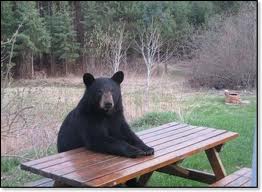Follow these Seven Rules for Camping Around Bears when you camp at Lake Allatoona. We know you want to become one with nature and the forest. We also know you don’t want to become one with a stray bear.
At the very least, it will give you something to think about while you’re lacing up your running shoes — and pouring honey on your companions’ shoes.
Don’t be skeered. You probably won’t see or even hear a bear. Probably.
Seven Rules for Camping Around Bears
Rule Number One: There are 5,100 bears in Georgia’s woods. You are playing in their backyard. Don’t get all uppity if a bear wanders near your campsite in his forest.
Rule Number Two: No matter how many Spiderman, Dirty Harry or Terminator movies you have watched, bears are more likely to eat you than you are to eat them. If you must fight for your life, fight for your life.
Rule Number Three: There are two levels of lion tamers: Professional and Severely Wounded. There are not many professional bear feeders, so plan on being severely wounded if you try to share a morsel with a bear. Get used to being called “Lefty,” if you survive.
Rule Number Four: Try not to slather yourself in BBQ sauce and sleep with leftover food in your tent. Bears will think you’re a sandwich with all the trimmings. Food in your tent is bear bait.
Rule Number Five: Don’t leave any food, drinks, coolers or garbage out in the open. Scents from such things as toothpaste, deodorant and soap can attract bears — and not in a good way.
Rule Number Six: When camping in the backcountry, place food and scented items inside a knapsack and hoist it out of reach of bears and other wildlife, at least 10 feet off the ground and six feet from the tree trunk. Better yet, if you are visiting a site with pesky bears, use a bear canister.
Rule Number Seven: If you are confronted by a giant angry bear, it’s better to save your life than to entertain him or her with your best Yogi or Boo-Boo impersonation. That only works in the cartoons. Avoid eye contact. Slowly back away. Or … spread your arms and legs, jump up and down and scream as loud as you can. It depends. As a last resort, remember: you do not have to outrun the bear — only your slowest companion.
The Bear Facts from the DNR Wildlife Resources Division
“Bears can become habituated to people when they are fed – whether intentional or not. When a bear knows it can get a ‘free meal,’ it will return again and again until eventually it loses its natural fear of humans. This is when the majority of human-bear conflicts occur, and the bear is labeled a nuisance,” explained Adam Hammond, a wildlife biologist with the Department of Natural Resources’ Wildlife Resources Division.
Black bears commonly are found in three areas of the state: the North Georgia mountains, the Ocmulgee River drainage system in central Georgia and the Okefenokee Swamp in the southeastern part of the state. However, black bears can and do range over larger areas; especially in early spring and late summer, when natural food sources are scarce. Young male bears are also known to disperse in an effort to establish their own territory. Such as your campsite.
Though now considered the most common bear in North America, the black bears were nearly eradicated from Georgia by the 1930s, due to unregulated market hunting, poaching and large-scale habitat loss. Sound wildlife management practices have restored Georgia’s black bears to a thriving population estimated at 5,100 bears statewide.
